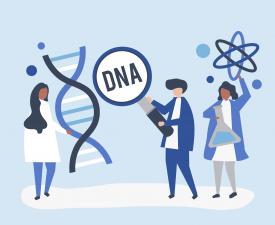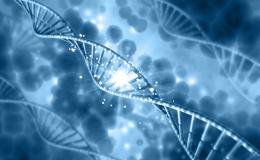Genetic Variations Affect Your Risk of Developing Inherited Cancer
August 10, 2020
A mere decade or so after Watson and Crick discovered the double-helix structure of DNA, scientists established the existence of both coding and noncoding DNA, the latter of which doesn’t code for amino acids. Perhaps a bit prematurely, noncoding DNA was coined “junk DNA” as experimenters, at the time, could not find an obvious purpose for this presumably excess DNA. Fast-forward 50 years into the future, and it appears that at least some “junk DNA” isn’t so junky after all.

Recently, a team from the Harvard T.H. Chan School of Public Health set out to find how common, single-nucleotide mutations called single nucleotide polymorphisms, or SNPs, found in noncoding DNA could increase cancer risk. The study analyzed the effect of 6 million SNPs obtained from the NHGRI-EBI genome-wide association study (GWAS) catalog on cancer risk across 13 body tissues. Of these 6 million SNPs, 872 were classified as SNPs that increase the risk of cancer, or cancer-SNPs. Interestingly, only 9.7% of cancer-SNPs were either exonic or located at a splice site. The study authors speculate the other 90.3% of cancer-SNPs may be involved in the regulation of genes, rather than the direct coding of proteins.
So which genes are the cancer-SNPs regulating? The researchers compared the number of cancer-SNPs to the number of other SNPs associated with cancer genes and found that cancer-SNPs were, in fact, more likely to associate with cancer genes. Additionally, the experimenters grouped cancer-SNPs and nearby genes into “communities” that are more likely to interact with one another than with other genes and SNPs in the genome. Through gene ontology classification, the researchers were able to broadly define the function of each individual cancer-SNP-gene community. Remarkably, across all tissues except tibial artery, communities with higher numbers of cancer-SNPs contained genes associated with immunity, and in particular, genes belonging to the major histocompatibility complex (MHC) I and II, suggesting that cancer-SNPs may contribute to cancer risk by altering the expression of these genes. Cancer-SNPs were also enriched in two communities with genes demonstrating tissue-specific functions: epithelium development in skin and cell adhesion in fibroblasts.
With a clearer understanding of which genes are regulated by cancer-SNPs, the research team investigated whether or not cancer-SNPs were located in the promoters of cancer genes and thereby regulating gene expression. The team mapped SNPs to promoter regions and compared SNPs located in the promoter regions of cancer and non-cancer genes. Cancer-SNPs were more likely to fall in the promoter region of oncogenes and tumor suppressor genes than other SNPs across all tissues. This finding suggests that some cancer-SNPs may regulate gene expression by altering cancer gene promoter sites.
This study highlights how collectively, common genetic variations can alter the expression of cancer genes and contribute to overall cancer risk. Importantly, the study authors point out that the overall contribution of each cancer-SNP to an individual’s total cancer risk is low: over 99% of cancer-SNPs have an odds ratio under 3. The researchers would eventually like to identify genomic regions that regulate the expression of many cancer genes for the development of prospective treatments and develop AI models to better assess cancer risk, which may further refine hereditary cancer risk assessment in the future. Today, hereditary cancer tests, such as the Kailos Genetics ExpedioTM Hereditary Cancer Screening test, allow physicians to anticipate which types of cancer a patient may develop based on their specific mutation, rather than simply a family history of cancer, and personalize screenings and preventive therapies designed to reduce risk and detect early stages of disease. Click here to learn more about ExpedioTM or contact us with any questions you may have regarding our screening products.




